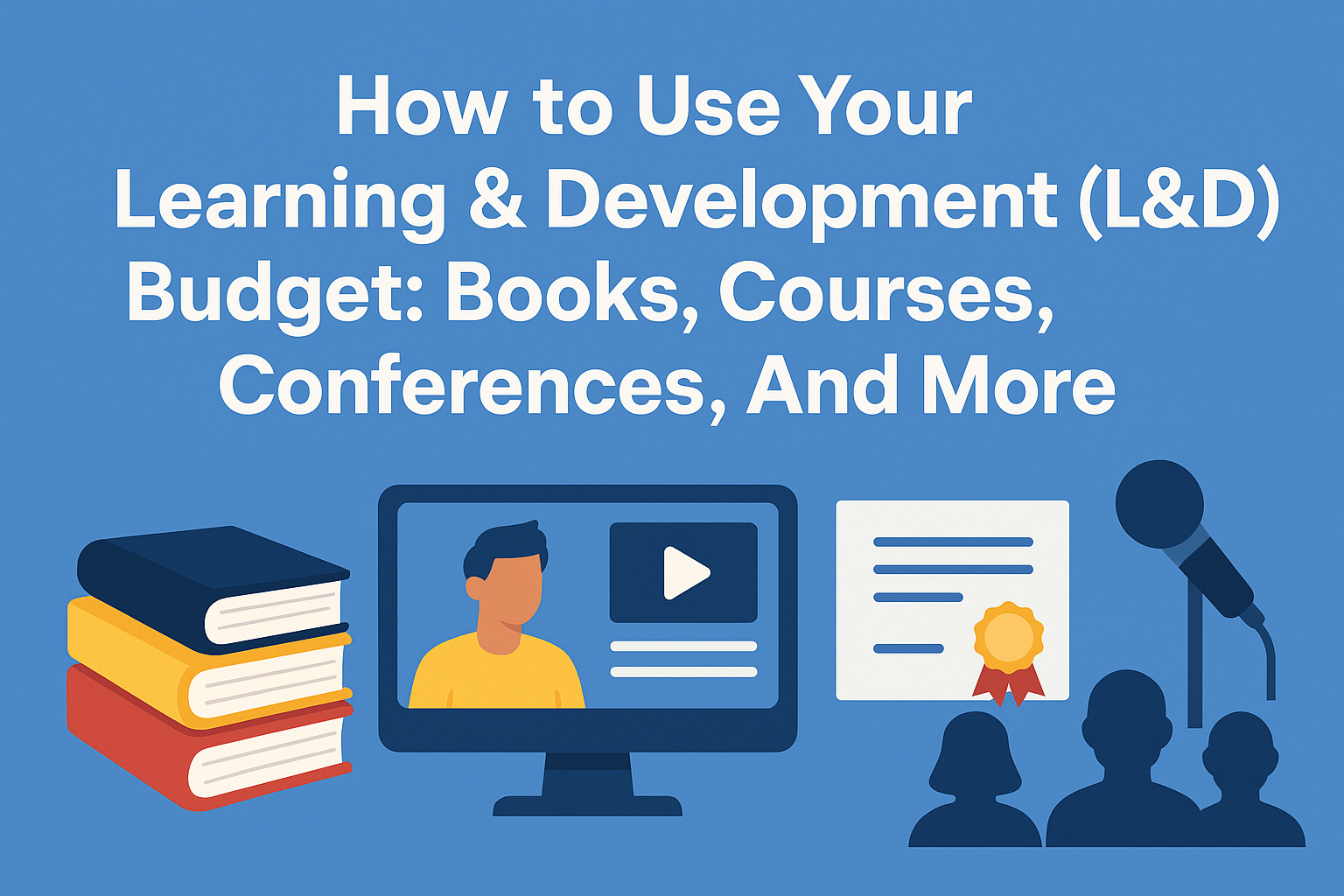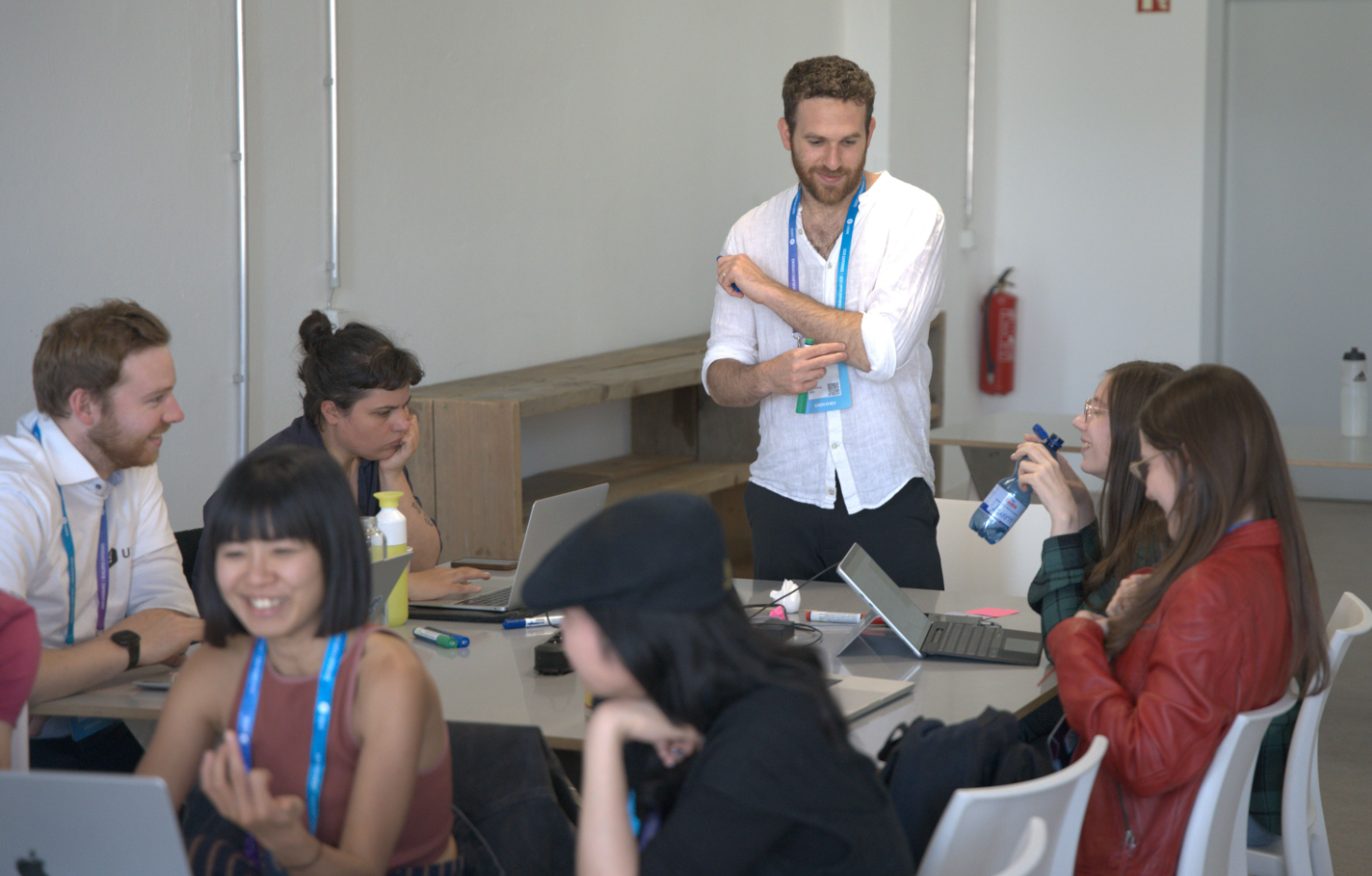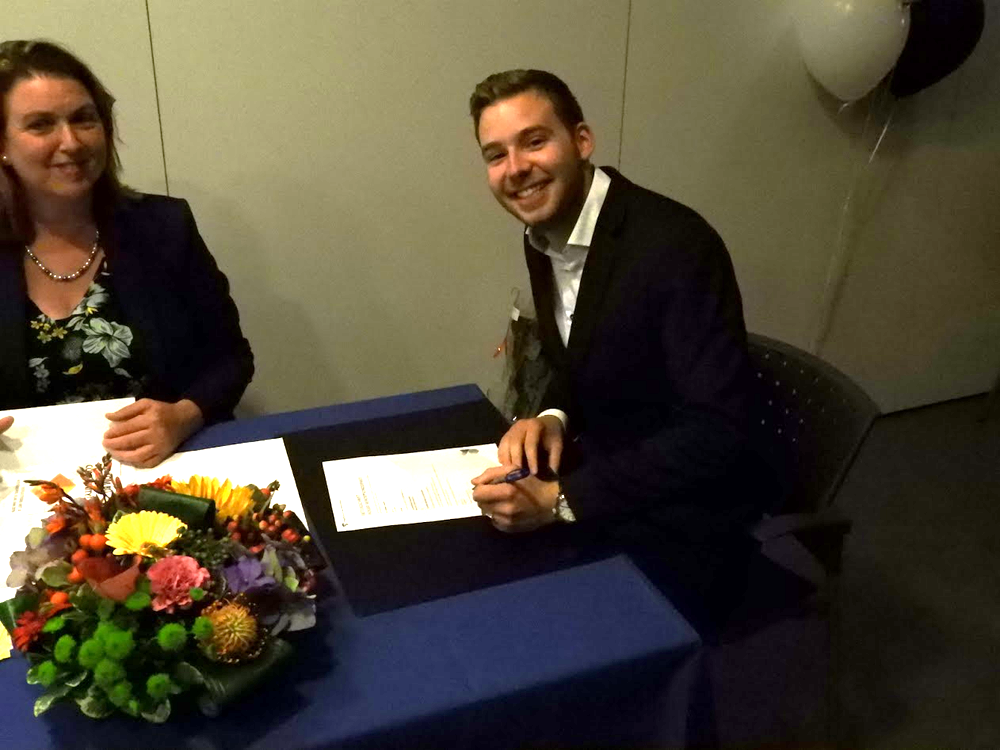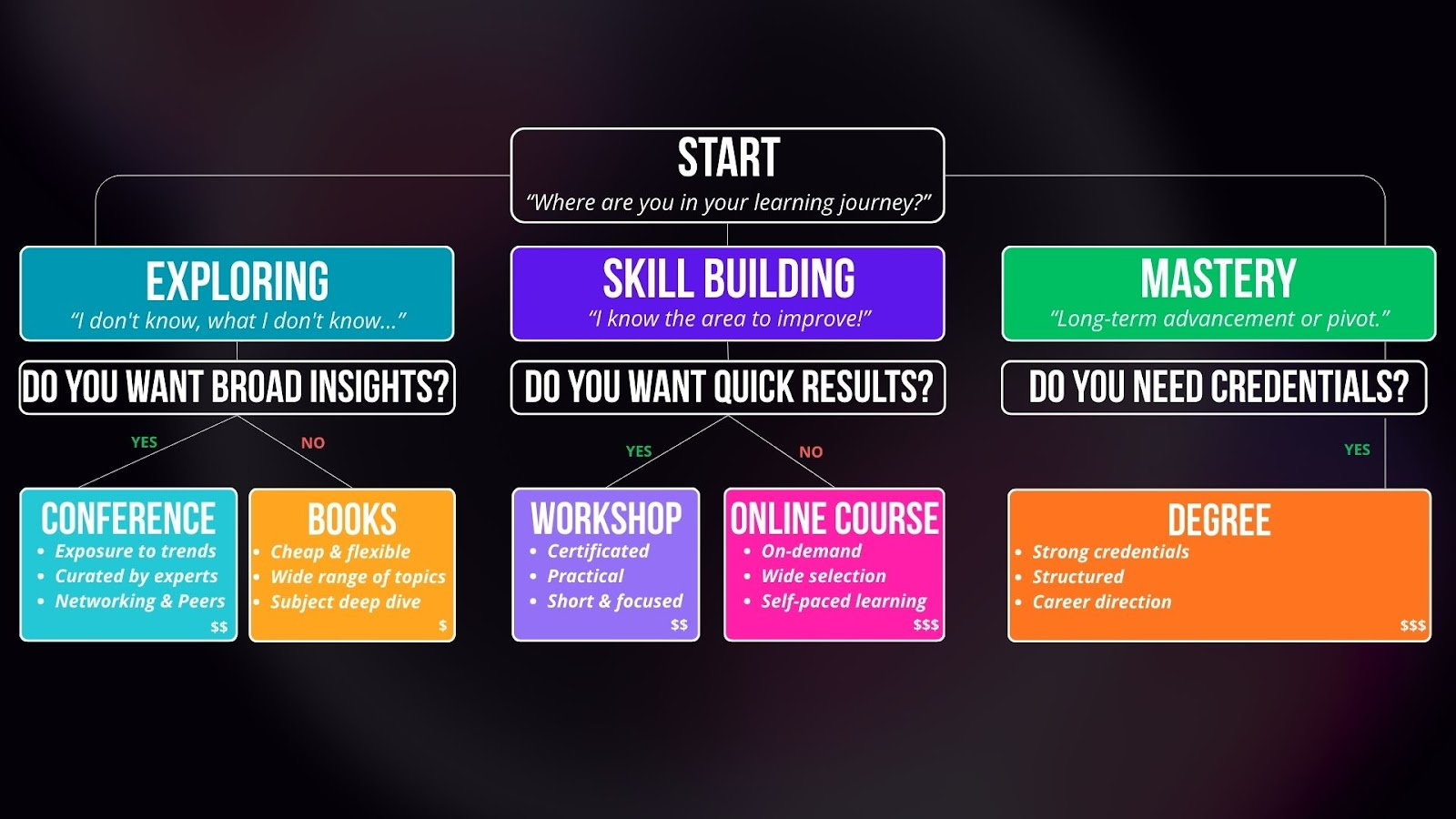How To Use Your Learning & Development (L&D) Budget: Books, Courses, Conferences, And More

Why most learning and development budgets go untouched
When I worked at LinkedIn, I had an annual learning and development budget. Sounds amazing, right? But year after year, I barely touched it. Half the time I didn’t know what I should be learning, as in what skills actually mattered for my career at that point. And when I did have an idea, I didn’t know how to spend the budget. Should I commit to a Master’s? Sign up for a pricey course? Or just buy a few books? Everything felt either too much or not relevant enough, so I ended up doing nothing… and every year the budget went unused.
Turns out, I wasn’t alone. Research shows that 31% of training professionals struggle to choose the right program, and 61% of companies say lack of time is the biggest barrier. No wonder so many budgets go unused. Which is a shame because the right development activities can really make a difference to both your career and the knowledge you bring to a company. That’s why I put this guide together: to make it easier to figure out what to focus on, and how to get support for it.
How to Use Your Learning and Development Budget Effectively
There are many ways to invest in yourself, from picking up a book to attending a global conference. Each has trade-offs, but the best choice depends on where you are in your learning journey:
- Exploring: When you don’t yet know what you don’t know and need exposure to ideas and trends.
- Skill Building: When you know what to improve and want focused, practical development.
- Mastery: When you’re ready for long-term advancement or even a career pivot.
We’ll break down the main learning formats (books, courses, workshops, degrees, and conferences) that map onto these stages, their pros and cons, and how to match them to your career stage. You’ll also get a decision tree to help you pick, and a template to make the case to your manager.
Exploring
1. Books
Books now include e-books and audiobooks you can fit into your day, making them one of the easiest, low-cost ways to use your budget. They work well for quick inspiration or deeper dives, but are often best for early exploration.
- Pros: Cheap or free, flexible format (read, listen, watch), wide range of topics, easy to integrate into your daily routine.
- Cons: Easy to collect but never finish, quality varies, requires self-motivation, less interactive than other formats.
- Best if: You want quick inspiration, a fresh perspective on your commute, or a deep dive into a subject without committing to a formal program.
Example from my career: Books often don’t hold my focus, so while the last book I read “The Diary of a CEO” gave me some applicable examples, I have found that I learn better through more interactive formats.
2. Conferences
Conferences pack high-impact learning and networking into an intense, condensed experience.
- Pros: Exposure to trends, access to experts, peer networking, real-world case studies to learn or validate. Lower cost than physical training, more exposure to different perspectives.
- Cons: Higher cost compared to books or online courses; less hands-on skill building.
- Best if: You’re looking to stay ahead of change, learn from peers, pressure-test your approach, and get new ideas for your team.

Example from my career: As both an attendee and organiser, I’ve seen how talks at conferences hit differently than online sessions.One that stuck with me was by Andrew Birgiolas, who used humour to teach collaboration strategies. But the biggest value for me has been networking. Every major career move I’ve made was supported by connections I built at events. A study in the Journal of Applied Psychology found that people who network more see greater career success over time, which is a great reminder that peer-to-peer exchange is just as important as the talks themselves.
Skill Building
3. Workshops
Workshops are hands-on and practical, giving you direct experience in a short burst of time.
- Pros: Interactive, more custom experience and guidance. More applicable to the work you´re doing and great for team learning and bonding.
- Cons: Higher cost than online courses, narrow in scope, tied to a schedule.
- Best if: You want to sharpen one skill quickly, get better learning from a tutor in the room and be able to apply it immediately at work.

Example from my career: At UXDX I joined a workshop on AI for UX writing. This taught me that workshops fit my learning style much better. In just a few hours, I left with practical tools I could use immediately in my day-to-day work. Plus, workshops often come with a certificate, which feels like small but motivating validation.
4. Online Courses (Udemy, Coursera, MasterClass, LinkedIn Learning)
Online learning platforms give structure at a low cost, but the challenge is finishing them.
- Pros: Affordable, on-demand, wide selection.
- Cons: Easy to abandon, quality varies, no real interaction.
- Best if: You want specific skills or technical knowledge at your own pace, or if you’re working with a limited budget.
Example from my career: At LinkedIn, I had full access to LinkedIn Learning. While I completed a few courses, most felt too generic or disconnected from my job to actually upskill me. Similarly, I’ve started HubSpot courses and abandoned most of them midway. Unless the course is an exact fit for what I need, I struggle to stay engaged. In fact, research on massive open online courses (MOOCs) shows completion rates as low as 30% of enrollees. Add to that the explosion of so-called “expert” courses, where selling the course is often the real business model, and it’s clear why online learning can be hit-or-miss.
Mastery
5. Formal Degrees & Certifications
Degrees and certifications are the most recognised path, but also the most expensive and time-consuming.
- Pros: Strong credentials, structured, career direction.
- Cons: Expensive, long time commitment, often lags behind industry trends.
- Best if: You’re ready for a career pivot or long-term advancement.

Example from my career: I considered doing a Masters, but the cost and time commitment was too high. With uncertainty about where I’d live long-term, it wasn’t the right choice.
How to decide which option is right for you
Think of your learning and development budget as a toolbox. The right tool depends on the job you need to do. Focus on your goals and try answering “Where are you in your learning journey?”. If you’re unsure what you don’t know yet, you likely need to explore more broadly. Books can be an easy and flexible way to learn about a (new) topic in your field. Conferences are also great to get the inspiration you need to discover what you could be learning, and provide you with a solid opportunity to expand your network.
If you know what you want to improve you are focused on skill building. Depending on how quick you want results both workshops and online courses are great to achieve this.
However if you want a long-term advancement or a career pivot, you might want to dive deeper into a topic. Then depending on if you need credentials you can choose to go for a degree or certification.
You can find a decision tree below to help you navigate towards what you need to do for your next play.

Example from my career: One thing I’ve learned is that development isn’t static, since the approach changes with each stage of your career. Early on, classes and books gave me the foundation. Later, practical experiences, workshops, and networking became far more valuable.
At LinkedIn, they had a concept called “Next Play” where you’re always preparing for your next role. That mindset helped me earn a promotion after building an education program outside my core role. Ignoring the learning and development budget means missing out on opportunities like: promotions, new jobs, salary increases, or even starting something of your own.
How to convince your boss
Sometimes the hardest part isn’t choosing, but it’s getting sign-off. So, how do you ask your manager to approve learning and development spend?
By linking to business value, promising to share takeaways with your team, and showing how it fits the budget. Here’s a quick script you can adapt:
"I’d like to use part of my learning and development budget to attend [conference/course]. It will give me exposure to [specific skills/trends], and I’ll run a short session to share insights with the team.The cost is [X], which fits within the budget."
If you want to go one step further, here’s a mini-template you can use to build your case:
- Event/course: [Name, date, location/format]
- Cost: [Ticket price + travel if needed]
- Focus: [Key skills or themes covered]
- Team relevance: [How it supports current priorities]
- Planned knowledge-sharing: [E.g., “30-min team presentation afterwards”]
- Career relevance: [How it connects to your personal growth goals]
Example from my career: I’ve learned the hard way that requests only succeed when they align with both company needs and your long-term career goals. In my current role as Global Marketing Manager, I requested to attend a content-focused conference. However my manager pushed back, and asked me a simple question: why this conference, and why now?. Not because it wasn’t valuable, but because we hadn’t yet defined whether content was a core marketing strategy. It taught me that your case becomes much stronger when you can connect your learning to both company priorities and your future ambitions.
Conclusion
Your learning and development budget is more than a perk, it’s an investment in your future. For me, workshops gave practical wins, and conferences expanded my network in ways that changed my career. Those investments paid off far more than the books and online courses I left unfinished. The biggest lesson? Spend your budget on things that align with where you want to go next.
Looking back, the real mistake I made early on wasn’t choosing the wrong option, it was doing nothing at all. Don’t let your budget expire unused. Even if you’re not sure your company offers one, ask. The worst that can happen is a “no.” Pick an option, make the case, and put it to work for your next play!
Arjan Habben Jansen
Global Marketing ManagerUXDX
Marketing for me has always been about people, not just numbers. At LinkedIn and Pinterest, I worked with hundreds of companies each quarter to help them get real results by focusing on quality content and measurable impact.
Now at UXDX, I lead the global marketing and focus on growing a community where product, design, and engineering teams can connect, learn, and push their industries forward. I’m passionate about using data and storytelling to create strategies that deliver results while building genuine connections.
Get latest articles straight to your inbox
A weekly list of the latest news across Product, UX, Design and Dev.

